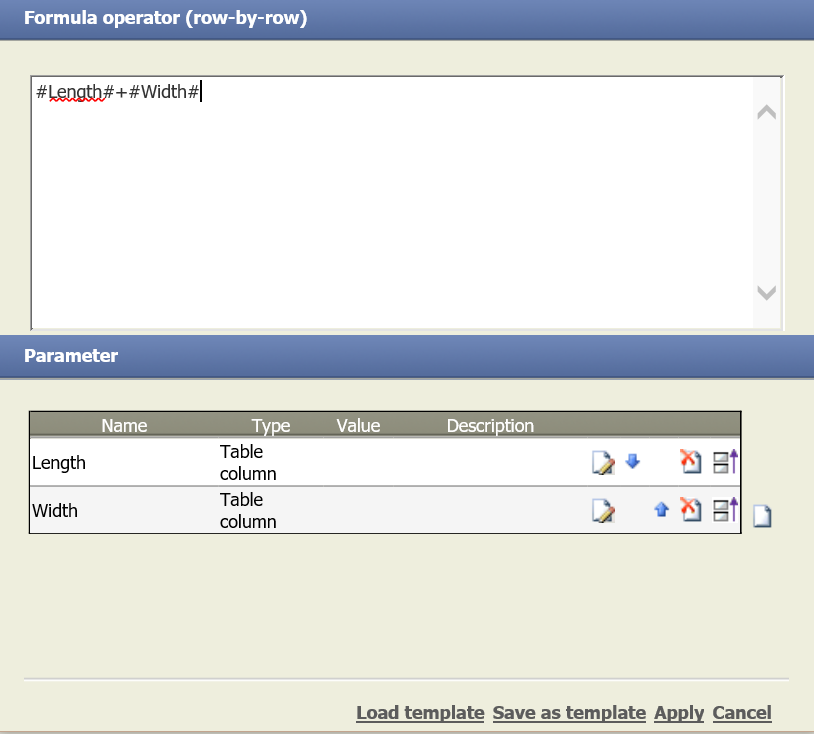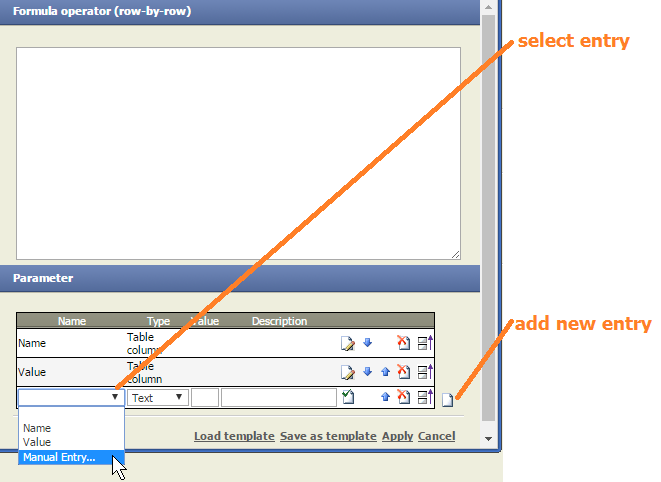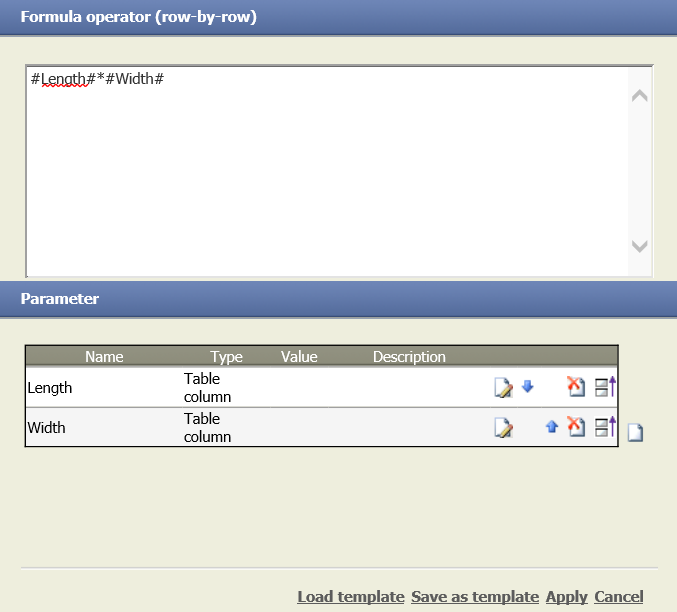Formula operator (row-by-row) (4.0) = Formeloperator
Summary
A user-defined formula can be entered in C# syntax. This formula is then applied to each row of the input table sequentially starting at the first row. A new column is created containing the results of each row's calculation. As the operator processes the rows in a sequentially, it can refer to the calculation results of the previous rows.
Examples: Calculating a sum of values from two columns, re-formatting data, writing "if ... then ... else ..." scripts, creating "signal lights", etc.
Example: Add values from two columns
Situation |  |
Step 1 | Edit function in the Operator settings  |
Step 2 | Enter formula and click "Apply"  Please note: Variables have to be enclosed by # to be recognized. #Length#+#Width# means, that the values of the columns "Length" are added to the values of column "Width". |
Result |  |
TIS Project |
Want to learn more?
A user-defined formula can be entered in C# syntax. This formula is then applied to each row of the input table sequentially starting at the first row. A new column is created containing the results of each row's calculation. As the operator processes the rows sequentially, it can refer to the calculation results of the previous rows.
Parameter
Using C# in TIS
C# Syntax:
- Formulas and more information under MSDN
- C# is case sensitive. Be careful with upper and lower case letters!
- Write the constant with decimal places -->
7.0if an operation is supposed to yield a number with decimal places and you are working with constants. - class names must be fully qualified, e.g.
System.DataTime.Now
Specific in TIS:
- Variables have to be enclosed by # to be recognized.
#Length#+#Width#means that the values of the columns "Length" are added to the values of column "Width". - Additional functions, such as the Ximes Helper (XIH) Functions and built-in variables such as
rownumberprovide additional functionality. Please refer to the sections below. - XIH Functions do NOT allow # in the notation of variables. Example: write "Identifier" instead of "#Identifier#".
Variables can be
- columns
- TIS parameters
- manual entries

NOTE: manual entries can only be named at creation time. Click into the combo box with text "Manual Entry..." and edit the text.
NOTE: manual entries must not contain spaces in their names.
Good editors for formula operator: Easier editing in the Formula Operator
Examples and Formulas
First Steps
Example 1: Multiplying two values
Situation |  |
Operation setting |
Please note: Variables have to be enclosed by # to be recognized. #Length#*#Width# means, that the values of the column "Length" are multiplied by the values of column "Width". |
Result |  |
Example 2: Calculation with integral numbers or decimals
- 5 / 2 equals 2 (integral number, rounded down). Without conversion to Double, the C# Compiler automatically converts to integral numbers.
- 5.0 / 2.0 equals 2.5 (decimal number).
- 5 / 2.0 equals 2.5 (decimal number), because at least 1 number is a decimal.
- (double) #Integral number column# converts an integral number to a decimal.
Example 3: If then else
Description | Formula |
|---|---|
If value in the column is greater than 3, then write 1, else write 0 into result column. | #Column# > 3.0 ? 1.0 : 0.0 |
If the date of the column lies between 2003/01/01 and 2003/09/30, then write 1, else write 0 into result column. | #Date#.Year == 2003 && #Date#.Month <= 9 ? 1 : 0 |
Example of a complex If: | #timefrom# >1000.0 ? "N" : (#timefrom# < 100.0 ? "Free" : "F") |
Example 4: Write set values into a column
Description | Formula |
|---|---|
Write the same text into each row of a column: The text must always be written between inverted commas. Additionally, the result column type must be set to Text. | "Same text" |
Example 5: Two columns shall be merged to one identifier
Description | Formula |
|---|---|
Extends the functionality of Combine columns, e.g., yields a text separated by_ (Example: 01.01.2007 00:00:00_Department1) | #dateColumn#.ToString() + "_" + #textColumn# |
Syntax
Symbol | Description |
|---|---|
== | equals |
% | modulo |
|| | logical or |
&& | logical and |
Snippets
Key word | Background | Requirements | Code | Effect |
|---|---|---|---|---|
Avoid empty rows | It is often practical to avoid empty rows, e.g. because calculations based on these rows would not function with empty rows, or users would wonder why nothing appears. |
| (XIH.EqualsPrev("ID") == false ? #Keep# :(XIH.EqualsNext("ID") ? (XIH.GetInt("Helper", -1) + #Keep#) : ( XIH.GetInt("Helper", -1) == 0 && #Keep# == 0? (XIH.SetInt("Keep", 1) && XIH.SetDouble("Value", 0) && XIH.SetString("Description", "no matching data found")? 0:-999) : 0))) Or without ID (rowNumber < (rows - 1) ? (XIH.GetInt("Helper", -1) + #Keep#): ( XIH.GetInt("Helper", -1) == 0 && #Keep# == 0? (XIH.SetInt("Keep", 1) && XIH.SetDouble("Value", 0) && XIH.SetString("Description", "no matching data found")? 0:-999) : 0)) | The last sentence remains. Values are being deleted. |
Sort weekdays See also above "Date and Time" | If weekdays are displayed as Mo, Di … they will be sorted incorrectly. |
| 0 | The result is an Integer which can be sorted. |
Create HTML tables | With nice formatting. | Example: Adapt columns and formatting | Structure in formula operator: column HTML – data type Text /* Fix Prefix*/ "<col width='20%' align='left'> <col width='30%' align='left'> </colgroupX>" + "<thead bgcolor='#C0C0C0'><tr>" + /*Adapt column headings */ "<th>Name input value</th><th align='right'>Wert</th><th>Unit</th><th>Comments</th></tr></thead>") : "") + "<trX bgcolor='#FFFFFF'>" + /* ROW STRUCTURE */ "<trX>" + "<tdX>" + #Input# + "" + "</tdX>" + "<tdX align='right'>" + #Value# + "" + "</tdX>" + "<tdX>" + #Unit# + "" + "</tdX>" + "<tdX>" + (XIH.IsNull("Comment") || #Comment# =="" ? "-" : #Comment#) +"" + "</tdX>" + /* ROW ENDING */ (rowNumber == rows-1 ? ("</tableX>") : "")Afterwards concatenate the single rows to one cell with Spalteninhalt verketten. XIH.SetString("HTML", #HTML#.Replace("tableX", "table")) &&XIH.SetString("HTML", #HTML#.Replace("trX", "tr")) &&XIH.SetString("HTML", #HTML#.Replace("tdX", "td"))&&XIH.SetString("HTML", #HTML#.Replace("colgroupX", "colgroup"))and delete unnecessary columns except column HTML. | Good to use with HTML Portlet |
Format HTML Portlets | Make sure that fonts etc. fit. | HTML Portlet | Begin "<html><head></head><body style='font-size: 12px; font-family: tahoma,arial,helvetica,sans-serif;'>" End "</body><html>" |
|
Choose Holiday or normal | Select each using Parameter | all Types | (#XI.TISPar("Distinguish normal days from holidays")# == false) IN GERMAN: |
|
Structure FROM | For Access via SQL | Text | XIH.IsNull("Path") == false && XIH.IsNull("Table") == false ? (" FROM " + XIH.TISTable(#Path#,#Table#) + " ") : (XIH.EqualsPrev("dataset") && XIH.EqualsPrev("date") ? XIH.GetString("FROM",-1) : "") |
|
Nice Table | for Help | Text | <html> |
|
Calculate with times | E.g., for calculations with a formula if the operator General Calendar is not applicable | Text | Code for weekday: "" + (((int) #Von#.DayOfWeek) == 1 ? "1 Mo" : "" ) + (((int) #Von#.DayOfWeek) == 2 ? "2 Di" : "" ) + (((int) #Von#.DayOfWeek) == 3 ? "3 Mi" : "" ) + (((int) #Von#.DayOfWeek) == 4 ? "4 Do" : "" ) + (((int) #Von#.DayOfWeek) == 5 ? "5 Fr" : "" ) + (((int) #Von#.DayOfWeek) == 6 ? "6 Sa" : "" ) + (((int) #Von#.DayOfWeek) == 0 ? "7 So" : "" ) FOR TIME: FOR YEAR:
(#FROM#.Year).ToString("0000") + ", " +(System.Math.Ceiling( ((System.Convert.ToDouble(System.DateTime.ParseExact((#FROM#).Year.ToString("0000") |
|
Troubleshooting
General
Problem | Frequent Cause | Solutions |
|---|---|---|
Formula operator stops | There is some value that cannot be dealt with, e.g., a wrong date format | See How to find a row that causes the Formula Operator to stop |
Calculation is not working at all |
|
|
Column name is not accepted | Instead of one blank there are several blanks | Rename column |
Calculation yields wrong result (produces integers instead of decimal numbers) |
| The C# Compiler work as follows: Integer divided by integer produces integer. If you want a decimal as result, the data must be converted to Double.
|
Calculation yields a much too high result | Numbers are concatenated as text, then reconverted to numbers. Example: #DayNo# was exported as text, e.g., 19 from General calendar, but in the formula operator:
Cause:
| For 120.00 it would be good to use |
Error Message Input string not in correct format | Presumably, the formula yields a text result. BUT the result format in the operator is not set to text, but, e.g., to Integer. | Set the result format to Text. |
Operator outputs error message „invalid cast from int32 to DateTime” | Presumably, values in a data column are missing and a „missing value“ is interpreted as 0. |
|
Operator outputs error message “invalid cast ...” | In a column there are values of a type that is not expected (e.g., a number where a text is expected). |
|
Columns disappear | This is often due to wrong settings of the columns which shall be transferred. | Change column settings (see above). |
Unclear error messages | Possible causes
| May be try How to find a row that causes the Formula Operator to stop |
Editing
Problem | Frequent Cause | Solutions |
|---|---|---|
Formula gets very long |
| Measures against long formulas
|
Input of decimal numbers |
| Numbers with decimal places need to be written with decimal points (e.g., 0.5). Apart from that, fractions with decimal numbers need to be spelled in the language used in the TIS system, e.g., 0,5 in German TIS. Otherwise, 0.5 is interpreted as 5, since in the German culture there are numbers using points (e.g., 1.333.222,12) where the points need to be ignored during the reading process. |
Using Parameters in the Formula Operator
please see General Parameters in the "Formula Operator v04"
Related topics
C# functions (link)


